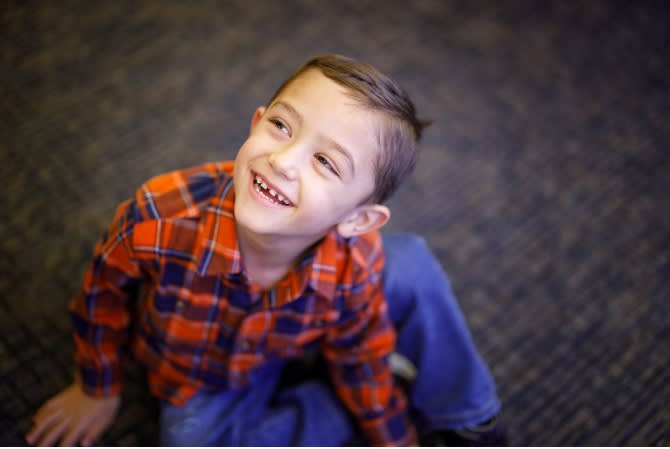Clinical trial brings hope to family of boy with rare seizure disorder

In many ways, Paxton Toves is a typical 4-year-boy — he has boundless energy, an inquisitive mind and a gregarious spirit. However, unlike most children, Paxton wears a monitor on his wrist that tracks the dozens of seizures he has endured every month since infancy — sometimes one a day.
Paxton lives with Dravet syndrome, a rare form of severe epilepsy associated with frequent, difficult-to-control seizures. With few effective treatments available for this condition, Paxton’s family worked with his neurology team at Mary Bridge Children’s to enroll Paxton in a clinical trial at the MultiCare Institute for Research & Innovation.
“Dravet syndrome is the most severe seizure disorder a child can have, and it comes with an increased risk of early death,” says Steven Phillips, MD, a pediatric neurologist at Mary Bridge Children’s and principal investigator of the trial. “There’s a big push to develop treatments that help these kids do well and live longer.”
A life-changing condition
At a month old, many babies are trying out different facial expressions, learning to hold their heads up and honing their eyesight. As Paxton worked toward these milestones, he experienced his first seizure.
Over time, the episodes increased in quantity and intensity, resulting in frequent visits to the emergency department and overnight hospital stays. The unpredictability of the seizures has been a particularly challenging aspect of this experience for Paxton and his family.
“We couldn’t take him to the park or the grocery store, or really anywhere outside our home because we didn’t know if he would have a seizure,” says Eric Toves, Paxton’s dad. “Safely managing them in a public place is difficult.”
Paxton’s seizure disorder meant that his parents couldn’t place him in day care or travel to visit relatives. As he grew from an infant into a toddler, he experienced developmental delays that affected his speech and behavior. And his family still didn’t know why the seizures were happening.
Paxton’s neurology team at Mary Bridge Children’s helped the Toves family access a program to cover the cost of genetic testing. Those results helped point his doctors toward a diagnosis of Dravet syndrome.
“Dravet syndrome is caused by a mutation to the gene that controls a sodium channel, or pathway, in the brain,” Dr. Phillips says. “The mutation causes cells in the membrane of this channel to malfunction, so sodium can’t flow in and out properly. Sodium affects electrical activity in the brain, and if not regulated, can cause seizures.”
While Paxton finally had a diagnosis, it didn’t make managing his seizures any easier. At one point, the data on Paxton’s wrist monitor indicated he had 35 grand mal seizures in a month. Grand mal seizures, also known as generalized tonic-clonic seizures, typically cause a loss of consciousness and are accompanied by severe muscle spasms.
After trying several medications that failed to control the seizures, Paxton’s neurology team recommended a phase 3 pediatric clinical trial for an experimental anti-seizure medication through MultiCare’s Research Institute.
“When families choose to participate in studies like this, it may not only benefit their individual child. If the data we collect can help us pinpoint a medication that’s effective in controlling seizures, then that’s helpful for all children with Dravet syndrome.”
“A lot of these clinical trials are only offered at a few sites around the country,” says Dr. Phillips, who has been conducting anti-seizure medication research for over 30 years. “One of the goals of our pediatric epilepsy research program is to bring these experimental treatments to our community so families don’t have to travel long distances to participate.”
Finding hope through research
Clinical trials have different phases, and each has their own purpose. By phase 3, a new treatment has already demonstrated effectiveness in people through previous rounds of testing.
At this phase, investigators want to know how the new treatment compares to the current standard: Is it just as safe, or safer, and is it more effective? If yes, then the treatment will be approved by the U.S. Food and Drug Administration for use.
The phase 3 trial Paxton joined is double-blind and randomized, which means he was assigned by chance to one of two groups: one received the standard treatment and another received the standard treatment plus the experimental treatment.
In this type of study, neither the trial participants nor the investigators know who is assigned to which group. This study design allows investigators to accurately compare treatments and helps eliminate potential bias.
“When families choose to participate in studies like this, it may not only benefit their individual child,” Dr. Philips says. “If the data we collect can help us pinpoint a medication that’s effective in controlling seizures, then that’s helpful for all children with Dravet syndrome.”
The clinical trial is ongoing, and Paxton has transitioned into the long-term open-label extension phase of the study. During this phase, patients are guaranteed to receive the experimental treatment after first completing the double-blind portion.
While Paxton’s family may not know whether he started out with the experimental therapy, they are grateful for the care they continue to receive at Mary Bridge Children’s and the Research Institute.
“Paxton’s journey has been medically complicated, and there can be a lot of red tape that’s associated with that,” Eric says. “But Paxton’s care team has helped us through all those hurdles and kept them from becoming additional stressors in our lives. They’ve all just done an outstanding job of taking care of us.”
To learn more about leading-edge research in epilepsy and other areas, visit the MultiCare Institute for Research & Innovation. Visit the Dravet Syndrome Foundation to find out more about this condition and the progress toward effective treatments.



